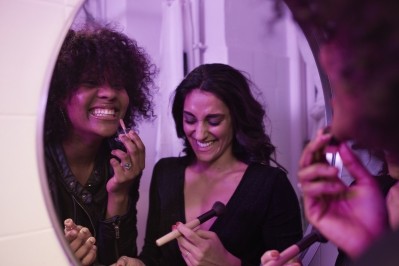Horizon beauty trends: Pet care, lab-grown ingredients and skin care cycles
![More consumers worldwide have companion animals in today's 'touch deprived' society, and so pet care will continue to rise in importance [Getty Images]](/var/wrbm_gb_food_pharma/storage/images/_aliases/wrbm_large/publications/cosmetics/cosmeticsdesign-europe.com/headlines/market-trends/future-beauty-trend-opportunities-in-pet-care-lab-grown-ingredients-and-skin-cycling/15976028-1-eng-GB/Future-beauty-trend-opportunities-in-pet-care-lab-grown-ingredients-and-skin-cycling.jpg)
Earlier this month, Helga Hertsig-Lavocah, senior futurologist and founder of Hint Futurology, said the beauty and personal care industry had to start innovating to empower consumers to take shorter, colder showers amidst the ongoing climate and cost-of-living crises. Cold showers, she said, were here to stay, and so formulations and products had to be adapted accordingly.
But beyond this, Hertsig-Lavocah told attendees at this year’s SCS Formulate in Coventry, UK, there were other important trends on the horizon worth keeping front-of-mind.
Pet care
Pet care had slowly edged into the spotlight in recent years, she said, with ‘pet-friendly’ cleaning products and prestige tasting menus for dogs, and numerous beauty and personal care brands had already jumped aboard.
“Companies, everyone, is looking for new markets, new niches to explore. Mature markets are saturated, that’s why they are starting to look at the pet care market,” she said.
In beauty, UK vegan brand Faith in Nature already offered an organic dog shampoo, in liquid or bar format, and LA-headquartered prestige hair care brand OUAI offered a pet shampoo. NYC-headquartered Kiehl’s also offered a range of dog grooming products, including a conditioner and cleansing spritz, and there were a number of smaller brands offering permanent and semi-permanent hair colouration for pets.
“We see more and more brands launching products for dogs (…) Some of them are new, some have been around for longer, but they’re all gaining traction,” Hertsig-Lavocah said.
This rising interest in pet care was being driven by an uptick in the number of consumers with companion animals in today’s “touch deprived” society, she said, as people looked to improve mental health and wellbeing through regular contact with a pet.
Looking ahead, therefore, she said it was clear that “as well as formulating for people, we’re going to have to formulate for pets”.
Lab-grown
Hertsig-Lavocah said another area of opportunity for beauty and personal care manufacturers would be around lab-grown, cell-based synthetics, particularly in the story behind why these were used and communication around it.
The environmental argument, she said, already gave a strong case for many synthetic alternatives, with the likes of vanilla now considered a threatened crop and a wider public mindset building around “saving the planet”.
And whilst many beauty brands had already long been working in this space, the difference ahead would be bringing this technology front-of-pack, she said. Youth to the People, a US skin care brand recently acquired by L’Oréal, for example, spoke about biotech collagen on the front of its packaging, and UK cannabinoid skin care specialist Cellular Goods worked exclusively with lab-made molecules, leading with this fact in all of its communication.
“For me, this is a mindset shift that is happening, and we have to ride this wave,” said Hertsig-Lavocah.
Whilst it was still only a small number of beauty brands communicating openly and proudly about lab-grown and cell-based ingredients, she said this was a direction worth following as consumer ideas around protecting the environment and sourcing alternatives would continue to build. She said a quick look elsewhere in the consumer goods categories proved this. In fashion, for example, intrigue around lab-grown fur was building as an alternative to vegan fur that was often petroleum derived, and major fashion house LVMH was “really championing” this shift. In food, lab-grown dairy alternatives were also causing a stir, offering an alternative to plant-based milks and the environmental impact many of these had, with Perfect Day highly engaged in this space.
Beauty and personal care brands and manufacturers had a real opportunity to recreate, re-engineer and improve existing formulas and ingredients to improve performance and overall environmental footprint with lab-grown ingredients, she said. “It’s a badge of honour and not something to hide. I think we need to stand up and be proud as scientists.”
Skin care cycles
The last horizon trend Hertsig-Lavocah identified as worth considering closely was the shift towards using beauty products in cycles, a movement especially popular in Brazil’s hair care category with capillary schedules or ‘cronogramas’ being followed closely by consumers.
“Basically, it’s product cycling; it’s a regime,” she said, with different product recommendations to follow from one week to the next.
Whilst the trend was already “very established” in the hair care category, she said it would likely gain ground in skin care soon; Olay, for example, was already talking about skin cycling. Industry therefore had to make sure it was ready to formulate according to these future regime and cycle needs, she said.
![There are plenty of stories the beauty industry can tell to help consumers better understand blue biotechnologies and ingredients developed in this way [Getty Images]](/var/wrbm_gb_food_pharma/storage/images/_aliases/wrbm_medium/publications/cosmetics/cosmeticsdesign-europe.com/article/2023/03/21/blue-biotech-in-beauty-needs-better-storytelling-and-consumer-engagement-say-experts/16270672-1-eng-GB/Blue-biotech-in-beauty-needs-better-storytelling-and-consumer-engagement-say-experts.jpg)
![Could sun care developers perhaps look to fish for inspiration in UV protective formulas? Biotech could enable entire new categories to be born in beauty [Getty Images]](/var/wrbm_gb_food_pharma/storage/images/_aliases/wrbm_medium/publications/cosmetics/cosmeticsdesign-europe.com/headlines/formulation-science/beauty-biotechnology-future-is-strong-with-new-category-opportunities-ahead-says-arcaea-ceo/16133075-1-eng-GB/Beauty-biotechnology-future-is-strong-with-new-category-opportunities-ahead-says-Arcaea-CEO.jpg)



















